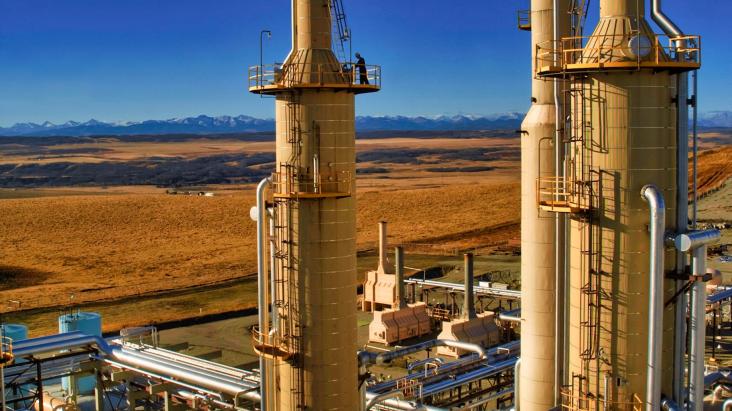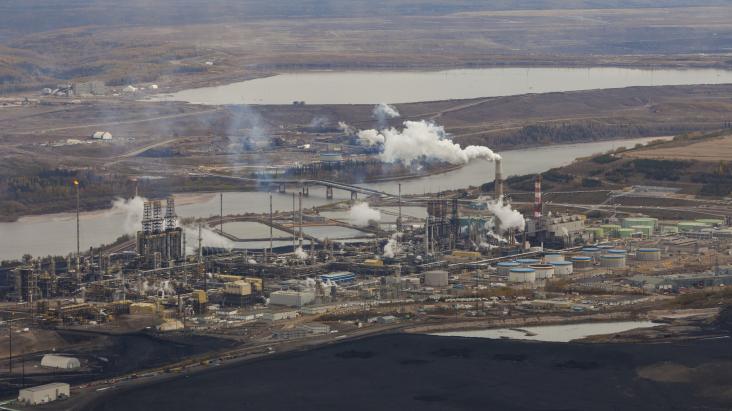Re-Energizing Canada
Envisioning Canada's future beyond oil and gas
Oil and gas have shaped Canada’s past—but that doesn’t necessarily mean they will be its future.
As the world faces tough questions about energy security and affordability amid mounting pressure for climate action, Canada urgently needs to have a frank conversation about the future of its energy sector. Without concrete steps to reduce Canada’s dependence on oil and gas and invest in a prosperous future, damaging economic impacts will be felt across the country.
Emerging market forces in favour of ever-cheaper renewable energy, coupled with the global response to climate change, will decimate demand for oil and gas. At the same time, oil and gas prices are increasingly volatile. From a climate perspective, the science is clear that the world has no real choice but to end new oil and gas exploration now while rapidly addressing remaining production.

This research project will shine a light on practical strategies for Canada to mitigate the risk of stranded assets, maintain economic stability, and protect Canadian workers and communities while facilitating the transition to secure, affordable, and reliable clean energy.
Over the course of this multi-year project and publications series, IISD will aim to answer the following questions:
- What is the outlook for oil and gas in Canada?
- What does a fair, feasible, and prosperous energy future look like in Canada?
- Which policy pathways will get Canada there?
By facing these challenges head-on, Canada can build a more competitive and resilient economy for all while simultaneously increasing its climate ambition.
Clean Energy Insights
This research series outlines the benefits of a net-zero economy for Canadians across the country.
The Bottom Line: Unpacking the future of Canada's oil & gas
This research series digs into the complex oil and gas questions facing policymakers as they assess Canada's place in future energy markets.

How Fossil Fuels Drive Inflation and Make Life Less Affordable for Canadians
New report takes closer look at how Canada’s dependence on fossil fuels impacts energy costs and prices of essentials such as transportation, home heating, and housing.

Why Liquefied Natural Gas Expansion in Canada Is Not Worth the Risk
An analysis of the economic and environmental risks of liquified natural gas expansion in Canada.

Why the Cost of Carbon Capture and Storage Remains Persistently High
New analysis explores if carbon capture and storage (CCS) is an economically viable solution for emissions reduction in Canada’s oil and gas sector.

Setting the Pace: The economic case for managing the decline of oil and gas production in Canada
This report examines how global demand trends and increasingly volatile markets will impact Canada's oil and gas sector.

Why Carbon Capture and Storage Is Not a Net-Zero Solution for Canada’s Oil and Gas Sector
Canada's oil and gas sector regards carbon capture as the primary solution for lowering its emissions—but a careful analysis of the evidence reveals major risks in relying on and funding this technology.

Why Canada Is Unlikely to Sell the Last Barrel of Oil
As new technologies and climate policies eat into global demand for oil, this investigation finds that Canadian producers face existential threats that will require bold government policy to diversify the country's economy.

Why Government Support for Decarbonizing Oil and Gas Is a Bad Investment
A close look at the value of government support for decarbonizing Canada's oil and gas sector finds that public dollars are spent more effectively on readily available and proven low-carbon technologies.

Why Canada’s Energy Security Hinges on Renewables
This deep dive into the evidence shows investing in clean, flexible, and reliable electricity grids is the best option to increase Canadians' energy security, particularly long-term affordability.

Why Canada Needs to Plan for a Steep Decline in Global Oil Demand
This analysis demonstrates that Canada can expect global oil demand to permanently decline in the very near term, as electric vehicle uptake and other societal changes pick up speed.

Why Canadian Liquefied Natural Gas Is Not the Answer for the European Union’s Short-Term Energy Needs
This investigation shows that Canadian LNG infrastructure would come too late to address Europe’s energy security needs and offer little benefit to Canada’s economy.

COP 28 Side Event | Canadian Leadership on Oil and Gas Phase-Out
This COP 28 side event showcases progress to date on phasing out oil and gas production in Canada.
In the Media

Reality check: exporting Canadian LNG won’t help Europe but will hurt Canada’s economy

If oil and gas companies aren't cutting emissions at peak profits, when will they get in the game?

Canada needs to plan for a steep decline in oil demand, or risk getting left behind

Feds should not waste their $15-billion Canada Growth Fund on carbon capture for oil

Canadians shouldn’t foot the bill for Big Oil’s costly carbon capture
Latest
You might also be interested in
In Search of Prosperity: The role of oil in the future of Alberta and Canada
This report assesses the market outlook for Alberta’s oil sector, using new modelling and a comprehensive analysis of eight key factors affecting the sector’s future.
Blocking Ambition: Fossil fuel subsidies in Alberta, British Columbia, Saskatchewan, and Newfoundland and Labrador
Canada's four fossil fuel-producing provinces provided CAD 2.5 billion in fossil fuel subsidies in the 2020/21 fiscal year.
Making Good Green Jobs the Law: How Canada can build on international best practice to advance just transition for all
This report provides recommendations for federal legislation that can advance just transition in Canada.
Green Strings: Principles and conditions for a green recovery from COVID-19 in Canada
Endorsed by Canada's leading environmental groups, this paper sets out seven "green strings" recommendations to apply to government measures to ensure a green recovery from COVID-19.

